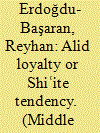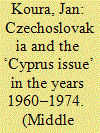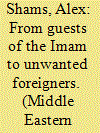|
|
|
Sort Order |
|
|
|
Items / Page
|
|
|
|
|
|
|
| Srl | Item |
| 1 |
ID:
183371


|
|
|
|
|
| Summary/Abstract |
This article compares and contrasts the shared and unshared functions of the Shiʿite elements within three separate but interconnected Buyruk texts. While introducing Shiʿite themes like the glorification of ʿAli and ahl al-bayt, the doctrine of the Imamate, and the matter of the 14 Impeccables applied in the Buyruks, with a comparative approach, this research will unpack the differences of their application in the Buyruks versus how they are perceived in the mainstream Shiʿite. This article will then draw attention to the fact that some of the fundamental Shiʿite doctrines are not acknowledged in the Buyruks including the belief in ʾismah, the concept of khalifa, the doctrine of tabarra and the notion of ghayba. In doing so, the following questions will guide this research: how do the Buyruks speak of Shiʿite motifs? Do those seemingly Shiʿite themes involved in the Buyruks lead Alevism to be labelled as Shiʿite and, if so, in what sense?
|
|
|
|
|
|
|
|
|
|
|
|
|
|
|
|
| 2 |
ID:
183377


|
|
|
|
|
| Summary/Abstract |
The nineteenth-century news market offered benefits beyond sales incomes to opportunists functioning in local and global news markets. The owners of newspapers could come to terms with governments to publish in their favour. They could exploit political tensions among the Great Powers to manipulate governments into making agreements with them. They also utilized their influence upon groups of people to extract money from governments. The manipulation of news for personal gain is here investigated through the case of Selim Faris, journalist, son of author Ahmad Faris, manager of Al-Jawaib (1870-1884), owner of Hürriyet (1894-1897) and Khilafat-Hilafet, and author of The Decline of English Prestige in the East.
|
|
|
|
|
|
|
|
|
|
|
|
|
|
|
|
| 3 |
ID:
183369


|
|
|
|
|
| Summary/Abstract |
This study is based on a broad range of newly declassified documents which garner revelatory findings pertaining to the involvement of Czechoslovakia in the Cyprus dispute in the years 1960–1974. These new findings reveal that the countries of the Eastern Bloc sought to prevent the overthrow of the Cypriot President Makarios during the studied period, as his foreign policy ensured that the island would not become a NATO base against allied Arab countries in the Middle East. Czechoslovakia played a considerable role in keeping Makarios in power by arms deliveries (some of them hitherto unknown), which allowed him to build up the special police forces to counterweight the National Guard controlled by Greece and face attempts of the Greek junta to overthrow him. Additionally, this article analyses activities of Czechoslovak intelligence on the island which managed to obtain valuable information on the politically unstable Eastern Mediterranean and Middle East from the inner circle of President Makarios. Czechoslovak intelligence, contrary to the Ministry of Foreign Affairs, backed weapon sales to Cyprus and supported the island’s non-alignment policy because these guaranteed a steady supply of valuable intelligence on the entire Middle East.
|
|
|
|
|
|
|
|
|
|
|
|
|
|
|
|
| 4 |
ID:
183375


|
|
|
|
|
| Summary/Abstract |
Israel has been governed by coalitions since its independence. The act of coalition building not only forms governments but also serves as reaffirming the ideological and societal bounds of the state as well as reflecting implicit consensus on the identity of the state. The governance and institutionalization of ethnic and religious cleavages in either form of exclusion or accommodation have historically constructed particular coalition patterns, which this paper critically coins as the ‘legitimate circle of coalition building’. The functionality of this circle has declined to the point of being narrowed and destabilised in recent decades and it has become a potential stumbling block to the formation of consistent governments. This article claims that Israel’s recent political deadlock is the latest indicator of such dysfunctionality. To support this claim, this article first provides an historical account of governing contending variants of non-Zionism by putting Arab and Haredi (ultra-Orthodox) parties in its centre to decode the traditional limitations and Achilles heel of the coalition building activity. Second, the puzzling election trio of 2019-20 is analysed as an affirmative case by examining the campaign discourse of the political parties, the election results and the allocation of parliamentary seats, as well as inconclusive negotiation talks.
|
|
|
|
|
|
|
|
|
|
|
|
|
|
|
|
| 5 |
ID:
183373


|
|
|
|
|
| Summary/Abstract |
Until the 1930s, Mashhad, Iran received thousands of pilgrims from South Asia yearly, a central node in the Shiʿi shrine city network spanning the Persianate world. Within decades, South Asian pilgrims had all but disappeared from Iran. This article examines how Reza Shah’s drive to ‘nationalize’ Iran spelled the end for this transregional network, leading to harassment of South Asians, increasingly seen not as ‘guests of the Imam’ but as foreigners tied to British colonialism. These decrees included dress codes that banned turbans and veiling, requiring South Asians to wear distinct national clothing that visually marked them as foreign. As Reza Shah sought to demonstrate Persia’s development as a power on a par with European states, pilgrimage became a battleground for anti-imperialist sentiments – taken out on colonial subjects themselves. South Asians in Mashhad – primarily British Indian but also British Afghans – bore the brunt, including as victims of the Gauharshad Massacre. Modern Iranian nationalism required disentangling Iranians from pre-existing transregional linkages and subsuming local identities rooted in mobility, as in the shrine cities, to a homogenous national identity defined by borders and territory. Those inassimilable to the project of Iranian national sovereignty, like the long-standing South Asian community from Iran, were expelled.
|
|
|
|
|
|
|
|
|
|
|
|
|
|
|
|
| 6 |
ID:
183376


|
|
|
|
|
| Summary/Abstract |
Ali Salem was an independent intellectual, unbound to the regime or political parties. He believed that the intellectual must also be independent from the public. It does not mean he must be detached from society or elevated above it, but that he must avoid flattering it. Over thirty years of literary activity, Salem published 27 plays and hundreds of humoresques and short stories, which were collected in 15 books. He also published opinion pieces in the Egyptian press and periodicals. Salem was an uncompromising social and political whip, who criticized Egypt’s society and regime in the context of a political culture that limits freedom of expression and impedes the expression of views that contradict those of the autocratic ruler. The Article will focus on the witty humor Salem used in both his satires and plays to sharply criticize the socio-political maladies from which Egyptian society suffers and at the same time it served as a means to introduce to Egyptians the problems of their society in a way that would make it easier for them to internalize them, shake them out of their apathy and urge them to act in order to improve their lives for the better.
|
|
|
|
|
|
|
|
|
|
|
|
|
|
|
|
| 7 |
ID:
183372


|
|
|
|
|
| Summary/Abstract |
From Syria’s independence to the eve of the civil war in 2011, Kurds in Syria were subjected to state ethno-exclusion, economic and socio-political marginalization, impacting on their freedom and profoundly altering the demography of their region. The majority became stateless and sank into severe poverty, having to work illegally on their own land and participate in informal cross-border trade for their basic needs. This article examines this cross-border trade and its impact on interaction between Kurds in Syria and those in Turkey, arguing that it has not only been a socio-economic resource for marginalized Syrian Kurds but that these interactions have contributed to a broader social process of Kurdish political mobilization, which resulted in socio-political trajectories that became evident just before Syria’s civil war.
|
|
|
|
|
|
|
|
|
|
|
|
|
|
|
|
| 8 |
ID:
183368


|
|
|
|
|
| Summary/Abstract |
In this article, I will be examining the biography of Meletios Metaxakis, the Rum Patriarch of Istanbul between 1921 and 1923, analyzing the process leading up to his election as patriarch and the debates and division among the Greeks/Rums during this process. The patriarchate delayed the patriarch election after the Armistice of Mudros for more than three years, and was managed by a deputy patriarch. The main reason for the elections being postponed was the royalists-Venizelists division within Greece and the internal conflict that was the result of the reflection of this on the Ottoman Rums. In the elections held at the end of 1921, Meletios Metaxakis was elected as the Rum patriarch in Istanbul. When Venizelos lost the election in 1920, both the Istanbul and Ankara administrations, the new Athens administration and the Ottoman Rums that supported the King opposed Meletios, a supporter of Venizelos. The election was in fact a political move to reveal Venizelos’s influence on the Ottoman Rums and the patriarchate. While Venizelos, who lost the elections in Greece attempted to turn Istanbul into his own headquarters, with these elections he proved that he was a figure who had a major influence over both the patriarchate and the Ottoman Rums.
|
|
|
|
|
|
|
|
|
|
|
|
|
|
|
|
| 9 |
ID:
183378


|
|
|
|
|
| Summary/Abstract |
This article focuses on cartoons published by the magazine Molla Nasreddin between 1906 and 1931, which enjoyed a wide diffusion throughout the Muslim world. These cartoons focused on antiquity, pointing particularly to Egypt and Iran’s pre-Islamic past, as the centre of a political discourse and major elements to encourage resistance, identity, independence and legitimacy against European colonialism, revealing itself as an original and interesting approach, since antiquity was just beginning to be a political reference in those countries.
|
|
|
|
|
|
|
|
|
|
|
|
|
|
|
|
| 10 |
ID:
183374


|
|
|
|
|
| Summary/Abstract |
Over less than a century, the majority of the once nomadic Bedouin of southern Israel were moved to live in towns that were established for them by the state, in the process of urbanization. These towns are far from satisfying the desires and needs of all the Bedouin. The rest of the Bedouin prefer to live outside the towns in a rural space. Based on archival sources the study reveals that the early policy supported the establishment of rural agricultural villages and transferring all Bedouin into fellahin (peasants). This policy was only later changed towards urbanization, a change that brought a problematic outcome. At the core of this study is an attempt to trace the reasoning that stood behind these policies and to make an analysis of their development and implementations
|
|
|
|
|
|
|
|
|
|
|
|
|
|
|
|
| 11 |
ID:
183370


|
|
|
|
|
| Summary/Abstract |
This article examines the course of US-Syrian relations since the Six Day War of 1967 and it demonstrates how they began deteriorating as the Cold War between the superpowers intensified. The author argues that the bilateral relations were adversely affected by several factors that marginalized Syria’s image as a major player in the Middle East; Washington’s tendency to pay excessive attention to Soviet designs in the Middle East; the rise of pan-Arabism, which portrayed Egypt as a major threat to US interests in the region; the persistence of the Arab-Israeli conflict, and above all, the small size of the Syrian state and the weakness of its economy which prevented the American policy makers from courting its leaders.
|
|
|
|
|
|
|
|
|
|
|
|
|
|
|
|
|
|
|
|
|